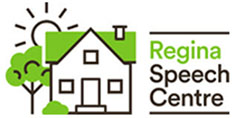Regina Speech Centre has always been a source for quality reading, writing and spelling assessments and therapy. We focus on identifying underlying areas of weakness for your child and providing recommendations to target some of the areas that are making reading difficult. So we thought in this unique time, while our children are at home we could give you some ideas for thing that will help any child be successful in reading. I have answered this question many times over my career, what do Speech Language Pathologists have to do with reading? The answer, to me, is simple. Language and literacy really are two sides of the same coin. So, if speech language pathologists are experts at language development, then it’s easy to understand how we may be able to provide some answers when reading doesn’t follow a normal path. Language is often seen as an oral to written continuum – spoken language is the foundation for learning reading.
It’s also important to remember that reading is extremely complex and encompasses many areas of the brain. Numerous parts of the brain work together to create functional reading. Basically your whole brain is involved! So it’s easy to see how the answer to what is going wrong is never simple. It’s important to screen and assess all areas of function to help determine a focused intervention program. This may require a team of professionals looking at all of the underlying skills that encompass reading.
So what exactly do speech language pathologists do as part of the team?
We help PREVENT difficulties by identifying children with language or sound difficulties early that may be creating risk factors for reading difficulties in the future.
We IDENTIFY children who have these underlying difficulties even before they begin reading.
We ASSESS phonemic awareness, phonics, vocabulary development, fluency in oral reading , comprehension, spelling, and written structures.
We PROVIDE THERAPY to children with risk factors, or to identified children to support underlying skills that may be critical in intervention.
We TEAM with other professionals to create an intervention plan that supports all of the student’s needs.
As children are now at home, we are all starting to feel the pressure of providing some kind of structure or home learning for them. Probably even more so if you feel your child is behind where they should be in school. We have really been appreciating the reminders that it is not our job to try to set up a home school for them, but we understand the stress that must come from trying to figure out how to support your learner at home. The following tips are meant to be something any parent can do with their child at home.
- Make Reading Fun Again
This is probably the one idea I hope you really leave with. No one enjoys sitting doing something that creates stress for them or that they don’t enjoy for long periods. Many of our learners have decided they are not good at this and they start to feel stress or frustration around learning to read. It gets harder to get them to read, but yet we know that the more you read the better your reading skills become. So what can you do?
Try reading to them. Research show that reading to children continues to support their reading development well into later grades. It allow for exposure to new vocabulary and creates interest in books and reading, which is key. Make sure you let them pick what is interesting to them! Magazines, blogs, sports statistics, recipes, science experiments; those are all reading too. It doesn’t have to be a book
Try reading with them. They read a sentence, you read a sentence. They read a page, you read a page. As long as they are reading, don’t stress if you’re doing some of it. Try audio books. It’s even more beneficial if you happen to have the book and they can follow along. There are lots of free audio books being offered right now, and libraries have always had audio books available for loan through their online lending system.
If they are reading independently remember to pick the right text level. It’s very frustrating to read something way above your level over and over again. Reach out to your teacher and ask specifically what level of text your child is working on. They may even have some great recommendations for you. Reach out to your library, they may be closed but I’m sure they will help you through email! Reach out to us if you want, we’ll try to connect you with some ideas. Below are a couple of links to connect you to websites which will help you with readability.
https://www.scholastic.com/teachers/bookwizard/
https://libguides.mnstate.edu/c.php?g=183311&p=1208264
Also remember, Monkey See Monkey Do. If we model reading in our home children are more likely to value it and do it themselves. Which leads to my next tip…
2. Show them what you do.
When we are reading with our children and they come across tough words or things that they are struggling with show them how you would tackle the problem. Point out if it’s a sight word and one that you have memorized. Model how you would break apart and re-blend that word. Tell them the things that you are doing as a “good” reader to deal with the text. Children who struggle often forget to apply strategies when they become overwhelmed or challenged. Teachers use modeling heavily during reading instruction as research has shown it is an effective strategy. Stop when reading and ask your child “What will happen next?”. Stop when you read a higher level vocabulary word and ask “Do you know that word and what it means?”, then talk about the meaning and link it to real life. These are often things that struggling readers don’t do naturally, but if we consistently show them how we learn they will start to do some of these things themselves.
If you are looking for some technology supports for students around modeling how to read and break apart words you can’t go wrong with the PQ Pop Up App. The PQ Pop-Up App has two modes of helping students: it can help them recognize words, and it can help them understand words. It is a completely free research based app that you can download into your browser that applies to any text you are reading on any website. It will provide support for any word a child can’t read or understand. It also has lots of practice reading on the site itself so you can learn how the use the app.
https://mlc.learningstewards.org/stewards-page/
3. Use every sense…
If you feel really strongly about doing some direct teaching work then I encourage you to engage every sense. If you are working on sight or spelling words think about engaging the whole body: trampoline out the sounds, write with a flashlight, write the words in shaving cream on a mirror, or use different colours to highlight words. The more of our body we engage, the more of our brain we engage. This will allow children to experience or learn in a way that may be more beneficial to them.
4. Vowels, Vowels, Vowels…
It’s fairly common for struggling readers and spellers to continue to have poor vowel knowledge all the way through the grades. There are no words without vowels, they are the heart of every word, yet many students can’t remember what sounds they make. It makes decoding unfamiliar words almost impossible. Most students I have assessed struggling with reading needed some work on either vowels (short or long), vowel digraphs (spelling combinations of vowels) or both. While it may not be an issue for all students, it is for many. They didn’t fully acquire or absorb the instruction around vowels when it was provided. Take some time to review the vowels and their sounds. It is often helpful to provide a few layers of sensory input when trying to remember vowel sounds. So have a visual cue for the sound, a movement cue for the sound, and link it to reading real words. You can do this in your every day reading. Pick a vowel sound to review and maybe point it out during your reading together time. I am reluctant to recommend a particular program, resource, or website for this because reading intervention really should be targeted and explicit and this requires a good assessment and direct instruction. However, as a parent at home it won’t hurt to review the vowels and their sounds and try to come up with some fun ways to remember them.
I hope you’ve found a few useful things to work on over the next little while. Stay safe and enjoy your time with your children.
These are my favourite websites for good all around information about reading and reading instruction:
https://www.readingrockets.org/
https://childrenofthecode.org/

